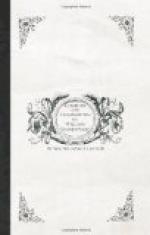William Shakespeare.
“Sir, if these men could deceive your worship for a moment, they might deceive me for ever. I could not guess what their story aimed at, except my ruin. I am inclined to lean for once toward the opinion of Master Silas, and to believe it was really the stolen buck on which this William (if indeed there is any truth at all in the story) was sitting.”
Sir Thomas.
“What more hast thou for me that is not enigma or parable?”
Joseph Carnaby.
“I did not see the carcass, man’s or beast’s, may it please your worship, and I have recited and can recite that only which I saw and heard. After the words of lugging out and breaking it, knives were drawn accordingly. It was no time to loiter or linger. We crope back under the shadow of the alders and hazels on the high bank that bordereth Mickle Meadow, and, making straight for the public road, hastened homeward.”
Sir Thomas.
“Hearing this deposition, dost thou affirm the like upon thy oath, Master Euseby Treen, or dost thou vary in aught essential?”
Euseby Treen.
“Upon my oath I do depose and affirm the like, and truly the identical same; and I will never more vary upon aught essential.”
Sir Thomas.
“I do now further demand of thee whether thou knowest anything more appertaining unto this business.”
Euseby Treen.
“Ay, verily; that your worship may never hold me for timorsome and superstitious, I do furthermore add that some other than deer-stealers was abroad. In sign whereof, although it was the dryest and clearest night of the season, my jerkin was damp inside and outside when I reached my house-door.”
William Shakspeare.
“I warrant thee, Euseby, the damp began not at the outside. A word in thy ear—Lucifer was thy tapster, I trow.”
Sir Thomas.
“Irreverent swine! hast no awe nor shame. Thou hast aggravated thy offence, William Shakspeare, by thy foul-mouthedness.”
Sir Silas.
“I must remind your worship that he not only has committed this iniquity afore, but hath pawed the puddle he made, and relapsed into it after due caution and reproof. God forbid that what he spake against me, out of the gall of his proud stomach, should move me. I defy him, a low, ignorant wretch, a rogue and vagabond, a thief and cut-throat, a — {66a} monger and mutton-eater.”
William Shakspeare.
“Your worship doth hear the learned clerk’s testimony in my behalf. ’Out of the mouth of babes and sucklings’—”
Sir Thomas.
“Silas, the youth has failings—a madcap; but he is pious.”
William Shakspeare.
“Alas, no, sir! Would I were! But Sir Silas, like the prophet, came to curse, and was forced to bless me, even me, a sinner, a mutton-eater!”




